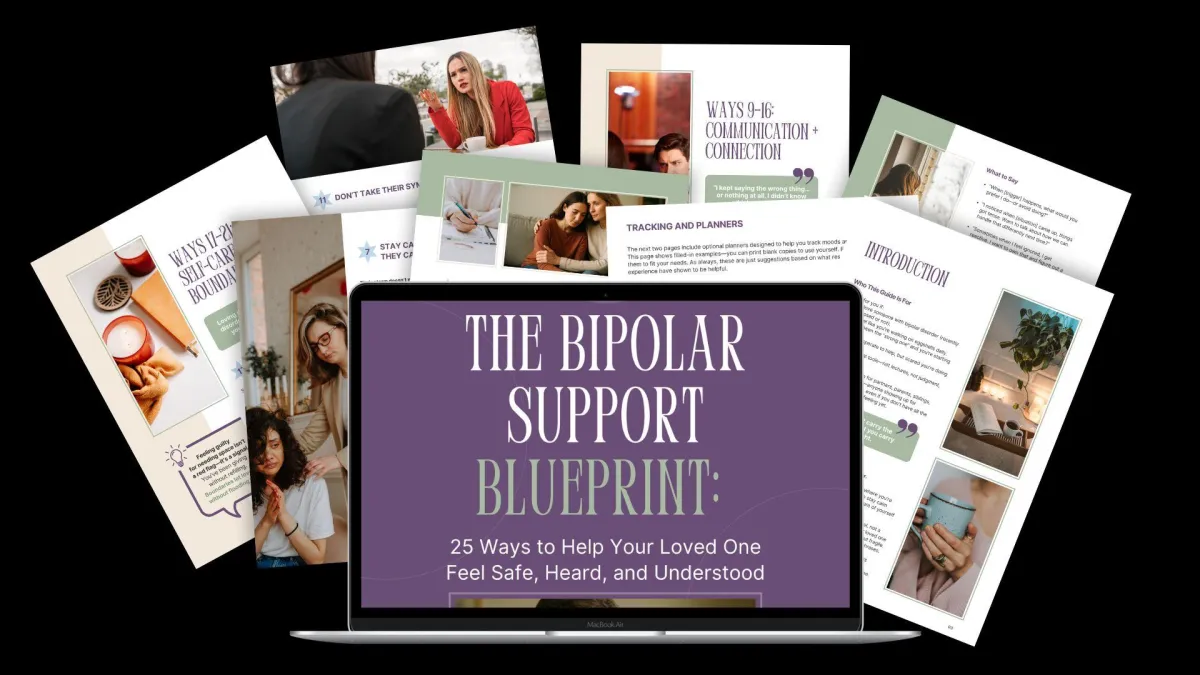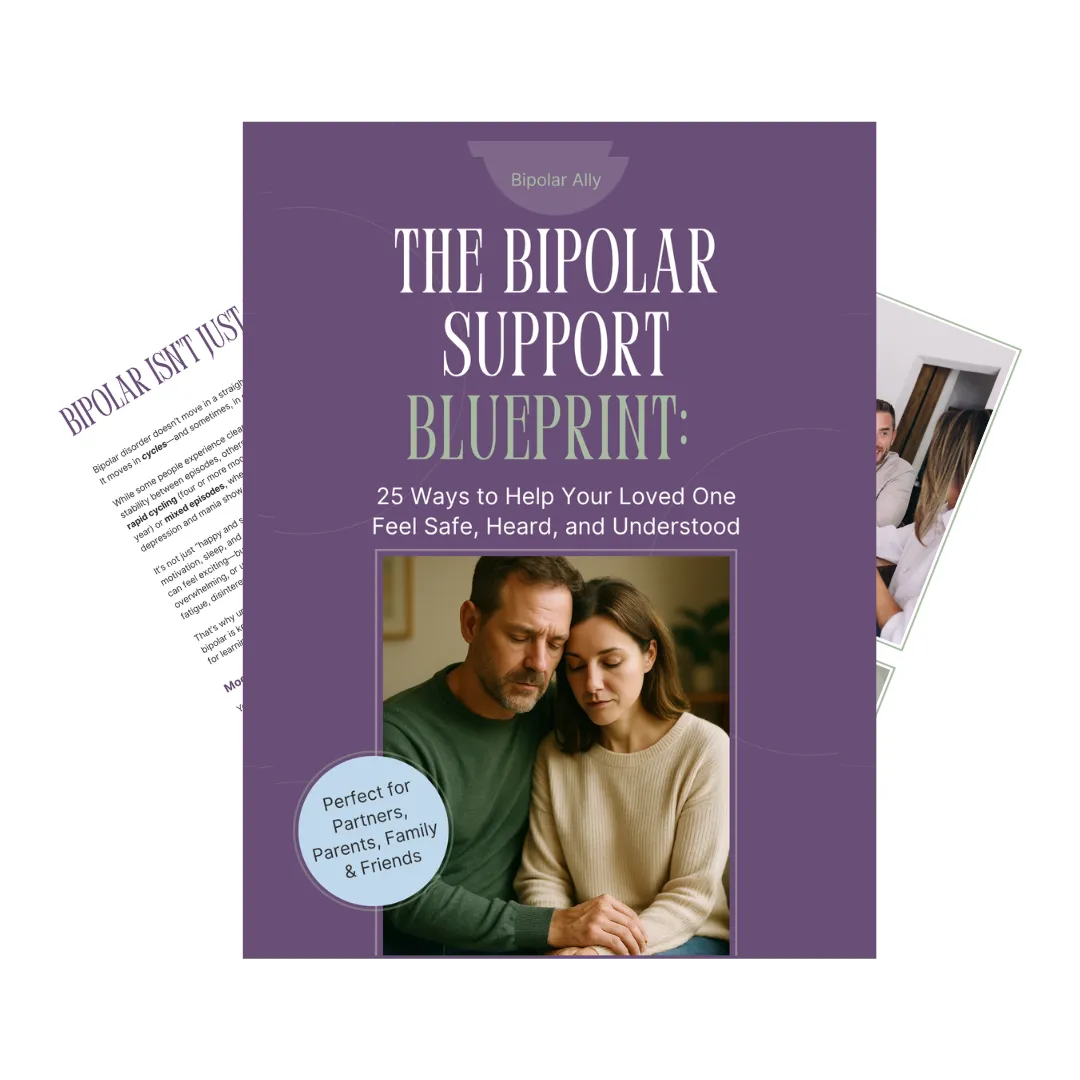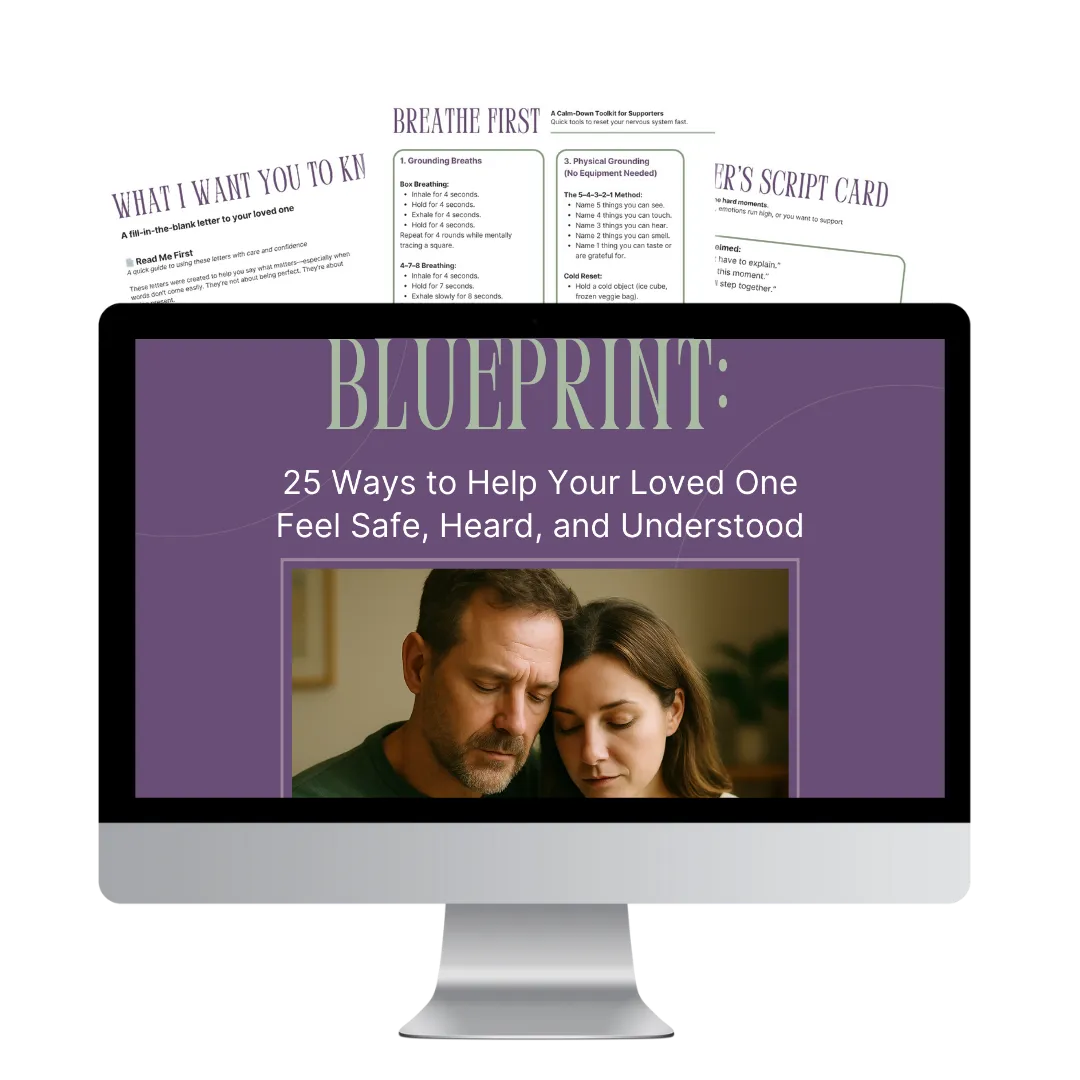🔥 This offer expires in:
🔥 This offer expires in:
Support Someone with Bipolar—With Confidence & Clarity
25 Practical Ways to Help Your Loved One Feel Safe, Heard & Understood, Even on the Hard Days
Based on real tools and clinical strategies, this guide helps you create a calmer, more connected relationship—no therapy license required.


ROWAN D.
A PARTNER
"My fiance was diagnosed with depression about 4 years ago, but recently after a particularly hard time, the diagnosis changed to bipolar 2 disorder. In a way, the diagnosis was a relief because we now knew what we were dealing with. I came across The Bipolar Blueprint while searching yet again for how to support my fiance, and it has been a game changer. I no longer feel helpless when she's upset and we've been able to use the guide to communicate and prepare for future episodes."
INTRODUCING THE BIPOLAR ALLY
Most Loved Ones Never Learn How to Truly Support Someone With Bipolar
—But now you can.
Is What You’re Doing Actually Helping?
Every day, thousands of well-meaning partners, parents, and friends try to support someone with bipolar disorder—but without the tools they really need. You offer love. Patience. Reassurance.
But when things spiral, it still feels like nothing you do is enough.
The truth?
Most support advice is either vague (“just be there for them”) or clinical (“use DBT and CBT strategies”)—and neither feels usable in real life when emotions run high, communication breaks down, or you're just trying to hold things together.
That’s why this guide was created:
To give you 25 practical, proven strategies to build trust, communicate better, and show up without burning out.
Whether your loved one is in crisis, recovering, or somewhere in between—this is your blueprint for offering support that actually helps.
You don’t need to be a therapist.
You don’t need all the answers.
You just need the right approach—and a willingness to stop guessing.


Understand What’s Really Happening
Most loved ones only see the surface—anger, shutdowns, mood swings. This guide helps you understand what’s really going on underneath, so you stop taking symptoms personally.

Know Exactly What to Say
(and When)
No more guessing. Get scripts, real-life phrases, and conversation tips that keep you connected—even when emotions are high or communication breaks down.

Stay Calm Without Losing Yourself
Support shouldn’t mean sacrificing your peace. Learn how to regulate your own emotions, set boundaries with compassion, and avoid burnout while still showing up fully.

Tools You Can Use Right Now
From crisis plans to mood trackers to communication scripts, this guide includes printable and fillable tools you can actually use—not just read and forget.
MORE THAN JUST A PDF
Knowledge is power. Introducing your superpower...
Right after your purchase, you'll receive your download of The Bipolar Support Blueprint: 25 Ways to Help Your Loved One Feel Safe, Heard, and Understood

READY TO SHOW UP BETTER FOR SOMEONE YOU LOVE?
Get The Bipolar Support Blueprint Today:
Stop second-guessing yourself every time you try to help, with science-backed tools and strategies.
Feel less helpless during their hard moments.
Strengthen your relationship, even in the chaos.
Feel seen and supported—because you're showing up, too. You're not alone in this.
GET THE BIPOLAR SUPPORT BLUEPRINT TODAY WITH LIFETIME ACCESS TO THE GUIDE + ALL TOOLS FOR JUST $17!

Loved by early readers. Designed for real-life support.
Exclusive Bonuses Just For YOU!
Along with the Course, get special bonuses that turbocharge your online success. These extras are designed to complement your learning and give you an edge in the digital marketplace. Act now to unlock these invaluable tools!

BONUS 1: "When You Don't Know What to Say"
A Supporter's Script Card
Keep this one-page cheat sheet handy for emotionally charged moments when words feel hard.
You’ll get a quick list of calm, validating, and boundary-setting phrases you can say on the spot—no overthinking required.
Perfect for printing or saving to your phone.
BONUS 2: Breathe First
A Calm-Down Toolkit for Supporters
Supporting someone with bipolar disorder is emotionally intense. This mini-guide gives you a handful of grounding tools to regulate your own nervous system—because co-regulation starts with you.
Includes:
✔️ Simple breathing techniques
✔️ Reset phrases
✔️ Quick physical grounding ideas (no equipment needed)
BONUS 3: "What I Want You to Know"
A Calm-Down Toolkit for Supporters
Sometimes the words just won’t come. This gentle, guided letter template helps you express your love, care, and desire to support—without conflict or confusion.
Use it during calm moments to open a heartfelt conversation.
Can be hand-written, typed, or even used as a journaling exercise.
READY TO GET STARTED?
Get The Bipolar Support Blueprint PDF Today!
With this guide, you’ll get immediate access to practical, research-backed tools that help you support your loved one with more clarity, confidence, and calm.
For a limited time, grab the full printable + fillable blueprint at a fraction of the cost of therapy sessions or trial-and-error.
Don’t miss this chance to stop guessing—and start feeling more connected, supported, and steady.
THE BIPOLAR SUPPORT BLUEPRINT
$17 USD
VAT/Tax Include

Backed by science, created with lived experience.
25 Support Strategies That Actually Work
Real-life tools to help your loved one feel safe, heard, and understood.
BONUS: Fillable Crisis Plan Worksheet
Know what to do when things escalate—before you're in the middle of it.
BONUS: Mood & Support Tracker Template
Spot patterns, triggers, and what actually helps—without needing to track everything every day.
BONUS: Communication Scripts for Hard Moments
Word-for-word examples of what to say (and what not to) during shutdowns, spirals, or fights.
BONUS: Self-Care Planning Page
Set boundaries without guilt and stay grounded while you support them.
BONUS: Supporter’s Script Card
A printable cheat sheet of calming, validating, and boundary-setting phrases—keep it handy for those emotionally charged moments.
BONUS: Calm-Down Toolkit for Supporters
Quick grounding tools, breathing techniques, and reset prompts to help you stay steady when emotions run high.
BONUS: Fill-in-the-Blank Letter Template
A gentle, guided template to help you express your care, intentions, and support—perfect for tough conversations or healing after conflict.
Still Got Questions?
Here's The Answers
Who is this guide for?
This guide is for partners, parents, friends, or family members of someone with bipolar disorder—whether newly diagnosed or managing symptoms for years. If you want to feel more confident, connected, and calm in your support role, this is for you.
Is this written by a medical professional?
No—this guide isn’t written by a doctor or therapist. It was created by someone with lived experience, combining personal insight, research, and practical tools that actually help in day-to-day life. It’s not medical advice—it’s the real talk and support most people say they wish they’d had earlier.
Will this help if my loved one isn’t officially diagnosed?
Yes. If you’re noticing mood swings, erratic behavior, or emotional intensity and you want to support someone more effectively, the strategies in this guide will still apply.
What makes this different from just Googling?
Most online advice is scattered, vague, or written for clinicians—not for loved ones in the moment. This guide gives you practical, real-world scripts, tools, and checklists you can actually use. No fluff. Just clarity and care.
Is this suitable for someone supporting a high-functioning loved one?
Yes. Many people with bipolar are high-functioning—but that doesn’t mean support isn’t needed. This guide covers the full spectrum, including how to support someone who’s working, parenting, or "seems fine" but still struggles.
Is this a digital or physical product?
This is a digital PDF download you can access instantly after purchase. It’s beautifully designed and printable, so you can use it on your device or print it out to keep on hand.
What if I don’t have time to read 80+ pages?
Don’t worry—it’s designed to be skimmable and easy to use. Each tip is broken into clear sections with examples, visuals, and quick-reference tools. You can read it all or just flip to what you need in the moment.
What if I still have questions after reading?
You’re not alone. That’s why we’ve included bonus tools and ongoing support suggestions. You’ll also be invited to connect with us on social media where we’ll share tips, lived experience stories, and encouragement.


All rights reserved Bipolar Ally
Disclaimer:
This guide is for informational and educational purposes only and is not intended to replace professional medical, psychiatric, or psychological advice, diagnosis, or treatment. Supporting someone with bipolar disorder can be complex, and every individual’s experience is unique. Always consult with qualified mental health professionals for guidance specific to your situation. The strategies, tools, and insights shared in this guide are based on research and lived experiences, but they may not be suitable for all circumstances. The authors and publishers are not responsible for any outcomes resulting from actions taken based on this content.